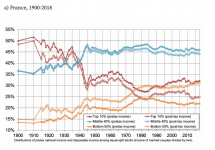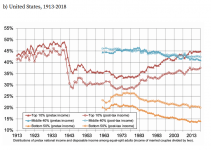Cergorach
The Laughing One
Generally yes, but not enough, that's why we create new jobs. Did the Doordash delivery person exist in 2010? Did the YouTuber exist before 2000? These things might be the most known inconsequential jobs, but there are so many others less known, but way more important. People also act as if other people can be only one thing, they can't learn new stuff, they shouldn't have to learn new stuff. And even if it's cutting edge stuff, it's young people from a new generation, they are now doing this new job and not an old one, thus making room for the workforce.The question that remains is, "do we still have unfilled jobs to fill?".
Now imagine that from an IT perspective, someone learned on Windows 3.11 and should not be forced to learn anything new... How much use would such an IT person be today if they didn't learn new things. You don't want to know the amount of pushback we got from IT personnel managing Windows Servers locally, when we started migrating folks to the cloud. The primary reason: we were taking their current jobs and forcing them to either learn something new or become obsolete. Many, many of those people could do that when push came to shove, some moved into managing those new cloud services, others moved to different branches of IT.
And it's not just IT people that need to keep learning new things, it's every profession. How many illustrators started learning digital tools? How many musicians? Even the manual labor jobs, folks needed to learn how to use a nailgun, new materials, new products, new rules, etc. Progress. And sure there are folks that can't keep up, that's why you need safety nets, so those folks don't fall flat on their face, but those people are a LOT less then people make them out to be.
Let me start that I grew up and live in a different country/culture (Netherlands), so my perspective and experiences are different from yours. I'm 49 and when I say youth, think '80s. We have relatively very little generational wealth, as our wealth is taxed, and then also inheritance is VERY heavily taxed. On the flipside we have social safety nets and people don't loose their healthcare when they loose their job. There are also processes in place where people either get retrained internally at a company or if they can't find a job in their current field are retrained by state run programs.I don't know precisely which events you are speaking of, so I won't try to address them. But, broadly and historically speaking, major job dislocation isn't just, "They find another job." Jobs that they are trained for go away, and don't exist. For many, if a next job exists, it is a lower-paying role. Job dislocation will cause many to spend their savings, so families lose generational wealth, or ability to retire. Folks lose their healthcare, their housing. Substance addiction rates among those impacted rise.
Even then, we've imported workers from Morocco and Turkey in the '60s-'70s as our local populations wanted to work in less physical jobs. After the Wall fell, starting in the '90s we had pretty big influxes of Eastern European workers. Still unemployment now has not been so low since 1975... For the last 50 years we've created more jobs then our population growth was able to support (in the end).
Now, this is not representative of the rest of the world, but it's an indication how things can work. And it's not as if where I live is a backwater country that doesn't do progress. Most people can move along with the progress, the small percentage that can't, we have social safety nets for. And addiction rates are not just tied to folks loosing their jobs, way more have addiction issues while they have a job.
Thoughtfully according to whom? If we would grade it along the lowest common denominator, we would still be living in the stone age. I'm not saying, don't care about other people, but don't make it an excuse either. Looking specifically at the US, there were and are already far greater issues, even before the general availability of LLM and image generation, and no one cared enough to fix that... It's either the folks that are potentially financially impacted, those that can profit from speaking out (license fees) or folks that have no skin in the game at all and doesn't cost them anything to shout "Boo!" from the sidelines.By no means am I saying that the world should not adopt technological change. I am saying that wonton adoption causes harm that we can mitigate if we actually approach things thoughtfully. You would see much less resistance to change if you actually offered those who will be impacted something to help them through that change, or you targeted the change to boost, rather than replace, the people impacted.
I don't drink alcohol, never have, never will. So for me it's easy to say: "Ban all alcohol!". I don't drive cars (it's just a safer world without me behind the wheel), so It's easy to say "Ban all personal vehicles!". Because I have no skin in the game, I'm not giving up anything, it doesn't cost me anything. So do the folks that don't use LLM and image generation, they don't use it in the first place so they can easily call for a ban.
I don't have anything against LLM or image generation, I use both. But I have issues with it's use and usefulness. ChatGPT pretty much gave LLM a public boost 3 years ago, but both LLM and image generation (and related technologies) were already available before then. Examples include 'AI' support tools, both for phones, chat and email. Certain companies moved far too fast on that technology and replaced people with software and that often turned into disasters, even if they were able to recover from that, they had trouble getting folks back for those jobs as people knew that if the technology improved they could be fired again like that. Even today Apple's 'AI' software still thinks I'm calling about an iPhone when I'm clearly saying "AirPods Max"...
The nature of LLM is that it doesn't know the answer, it just gives you word strings that you expect and statistically belong together. LLMs can be useful, as long as you 'know the answer', if it's just a system with no expert human oversight, it's going to cuase so many issues! An example of that is the hallucinated case law that none of the lawyers were expert enough to detect it or wise enough to double check. This is also why I currently don't use LLM for work (and image generation isn't generally not that useful in IT), I generally work on projects that are either edgecase, very new stuff or custom solutions for customers. Add to that that many customers haven't gotten approval from both their security and legal departments for using specific LLM solutions (eventhough many folks still use LLM despite those limitations). The problem imho isn't LLM or image generation, it's the people not using it properly, and in my experience this is most of them. It's interesting, it has potential, but so do nuclear reactors and I don't see everyone building reactors in their basement and backyard...





